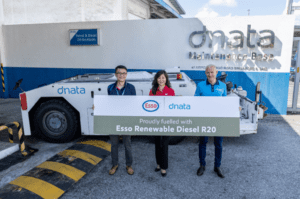dnata partners with ExxonMobil to lead renewable diesel trial at Changi airport

The trial uses Esso Renewable Diesel R20 (R20), which is a high-quality fuel with an estimated 15.4% lower lifecycle greenhouse gas (GHG) emissions compared to conventional diesel.
Made with a minimum of 20% renewable content, R20 can be used in existing diesel engines and is available at selected Esso service stations and through bulk delivery to commercial customers.
dnata is the first ground handler at Changi Airport to use renewable diesel, with partial funding provided by the Civil Aviation Authority of Singapore (CAAS) as part of its Aviation Sustainability Programme.
If successful, the trial could be rolled out to 200 airside vehicles and generator sets across dnata’s ground handling and cargo operations.
Charles Galloway, dnata’s Regional CEO, airport operations – Asia Pacific, said: “We are delighted to partner with ExxonMobil for this significant trial.
“dnata remains at the forefront of ground handling services in Singapore, with ongoing investments in cleaner-energy equipment and infrastructure. We look forward to working with ExxonMobil and CAAS to further reduce our carbon footprint throughout this trial, and beyond.”
Asia Pacific fuels sales director, ExxonMobil, Mabel Leung said: “We are excited to collaborate with dnata to provide Esso Renewable Diesel R20 in support of dnata’s sustainability goals.
“Renewable diesel is an engine-ready GHG emission-reduction solution that leverages our existing supply capabilities to customers. The partnership reflects our ability to offer lower-GHG emission solutions for the transportation sector, in Singapore and the Asia-Pacific region.”
The estimated reduction in life cycle greenhouse gas emissions, also referred to as Carbon Intensity (CI), is based on a comparison of Esso Renewable Diesel R20 to conventional diesel using the United States GREET 2023 Model estimates to compare the life cycle emissions of each fuel.













